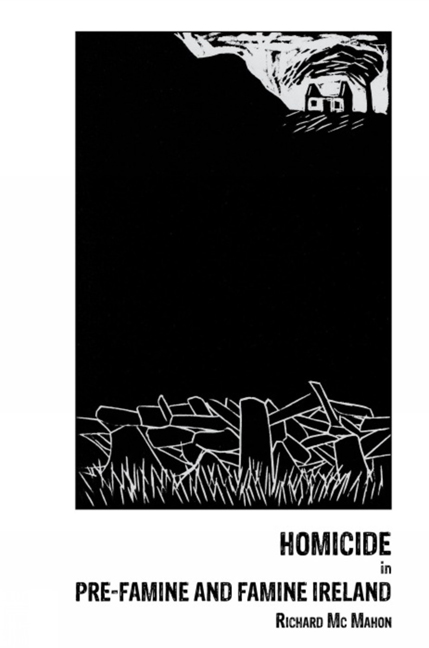Book contents
- Frontmatter
- Dedication
- Contents
- List of tables and figures
- Preface
- ‘A violent society’?
- 1 Homicide rates in Ireland, 1801–1850
- 2 ‘Do you want to pick a fight out of me?’: Homicide and personal relations
- 3 ‘Sending them to heaven’: Homicide and the family
- 4 ‘The tranquillity of a barrel of gun powder’: Homicide and land
- 5 ‘The madness of party’: Homicide and sectarianism
- Conclusion
- Appendix one: Methods and sources
- Appendix two: Homicide and motive
- Bibliography
- Index
4 - ‘The tranquillity of a barrel of gun powder’: Homicide and land
- Frontmatter
- Dedication
- Contents
- List of tables and figures
- Preface
- ‘A violent society’?
- 1 Homicide rates in Ireland, 1801–1850
- 2 ‘Do you want to pick a fight out of me?’: Homicide and personal relations
- 3 ‘Sending them to heaven’: Homicide and the family
- 4 ‘The tranquillity of a barrel of gun powder’: Homicide and land
- 5 ‘The madness of party’: Homicide and sectarianism
- Conclusion
- Appendix one: Methods and sources
- Appendix two: Homicide and motive
- Bibliography
- Index
Summary
Disputes over the use, control and occupation of land have been central to explanations of violent conflict in Ireland in the first half of the nineteenth century. The focus of study has very much been on conflicts between and among the various social groups in rural society and the degree to which these were rooted in and accentuated by the demographic pressures and prevailing economic conditions of the period. Cornewall Lewis argues, for instance, that rural unrest in Ireland was primarily rooted in pre-existing tensions in the relationship between landlord and tenant, which were accentuated by the demographic and economic circumstances of the late eighteenth and early nineteenth century with the ‘increase of the agricultural population, the want of employment and the consequent desire to get possession of land’. The conflict of interests between landlord and tenant found its clearest expression in the often violent activities of agrarian secret societies which were, in Lewis's view, ‘a vast trades’ union for the protection of the Irish peasantry’ whose chief object was to keep the occupier ‘in possession of his land, and in general to regulate the relation of landlord and tenant for the benefit of the latter’.
Landlord/tenant relationships also feature prominently in the historiography. For Beames, the main source of rural conflict in pre-Famine and Famine Ireland was conflict between tenant farmers and landlords over ‘the occupation and control of land’. Beames regards such conflicts as arising not so much from pre-existing divisions within the land system, but rather from attempts to change that system. It was, he claims, the activities of ‘a particular type of enterprising landlord’ and the incursion of the ‘pressures of the market’ into local society which gave rise to violent conflict. The activities of agrarian secret societies were, for Beames, primarily a reaction to the incursion of such market forces. For Joel Mokyr too, the primary cause of economic conflict was the ‘difference of interests between landowners and tenants’. He also identifies the roots of this conflict in broader economic changes. In particular, he cites the desire on the part of landowners, post-1815, to consolidate small farms into larger ones in order to reap the greater benefits of pasture farming over the more labour intensive tillage farming which had dominated the rural economy from the late eighteenth century.
- Type
- Chapter
- Information
- Homicide in pre-Famine and Famine Ireland , pp. 89 - 125Publisher: Liverpool University PressPrint publication year: 2013



